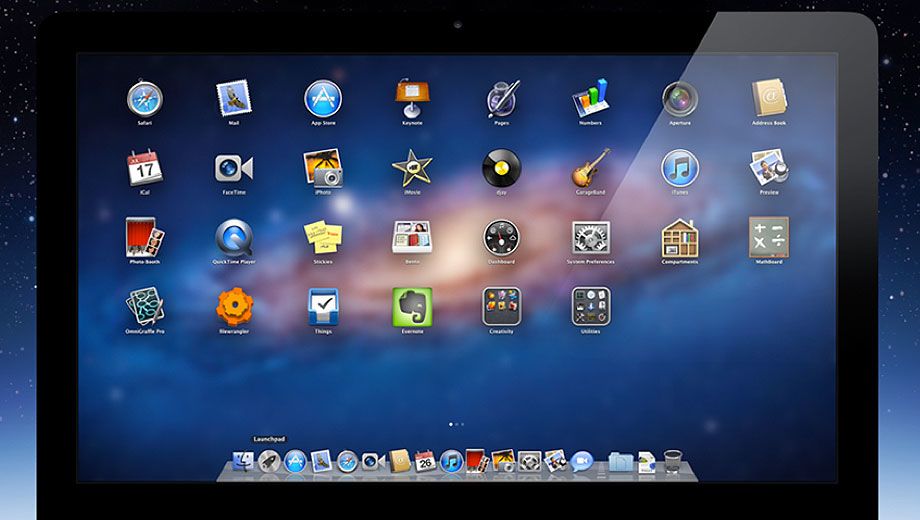Mac OS X 10.7 Lion: top 5 things business travellers need to know

Mac OS X 10.7 'Lion' is out now, with the software available to download from the Mac App Store in Australia right now. There are some very useful features for business travellers, so while we're installing it (at 3.74GB, you'll need some time or a pretty fast connection) here's our pick of the top five.
We reckon they're: App resume, auto-save in each app, Airdrop file transfer, full-screen apps (finally!) and the price. What do you think? We'll be talking about it all night on Twitter, so join the conversation with the hashtag #lion -- and don't forget to @mention us: @AusBT!
#1 App resume
One of the biggest advantages of Macs over Windows-based PCs (including Windows 7) is near-instant suspend/resume of the whole system, compared to the many seconds it takes for a Windows laptop to wake up and be ready for you.
Apple takes that another step forward in Lion. When you quit an app it's closed in a 'snap-frozen' state, so that when you open the app again it immediately launches at where to where it was before -- all the same documents open, windows in the same positions, and so on.
#2 Auto-save in every app
Microsoft Office has had good autosave for a long time, but it's a feature that has surprisingly made it into very few other apps.
On the other hand, Lion's autosave will work in all apps across the entire operating system. You'll never have to remember to hit CMD+S to save a file -- OS X 10.7 will save files every five minutes, or even when you take a break from the keyboard for a few seconds.
It doesn't save over your last manually saved version, either -- it creates temporary versions for the autosaves.
If you really screw something up and accidentally save the file with the changes (which would clear out autosaved versions in Microsoft Office), OS X lets you go back to previous autosaved (and saved) versions -- an extension of the existing Time Machine functionality.
#3 Airdrop
There has never been something in computer networking as simple as the floppy disk, or USB memory key for moving files between computers.
Sure, Dropbox is great once you set it up, but the setup process still involves a signup and software installation.
Most people simply don't get networking -- that's an area left to I.T. to set up ("just save it to drive G") or families lucky enough to have a geek born into their ranks.
Apple has made sharing files between Macs really simple with Lion. As long as the Macs are physically in close proximity, computers nearby will appear in the "Airdrop" section of the sidebar and files can be sent from one computer to another. (Files can't be retrieved from another computer, for security reasons, though -- that's an instance where you still need to set up proper networking.)
Apple uses some really lateral thinking and clever technology to make this possible -- it uses the same tech as in the iPhone to discover the physical location of your Mac, and where other people's Macs are. Nearby Macs can then automatically see your Mac.
#4 Full-screen apps
It's a bit embarrassing to say that full screen apps are one of the key features of OS X Lion, since they've been a basic part of Windows since version 1.0.
In fact, it's a bit of a change of philosophy for Apple, which has always advocated a multi-windowed desktop to allow users to select other windows quickly, and drag and drop things between them.
However, Apple has taken sharp notice of the popularity of the iPad and touch-screen devices in general, which are very much full-screen app devices, and has brought some of that thinking into OS X.
The reason it's interesting in OS X is because of how Apple has merged it with multi-touch technology on the Mac.
On Windows, switching between apps hasn't moved on much from the old ALT+Tab window switcher days (Windows Vista introduced a coverflow-style Windows switcher, but it doesn't seem to get used much.)
In Lion, it's possible to swipe between full screen apps using a three finger sideways swipe. Rather than showing you a list of icons or a thumbnail view of the app, it actually swipes directly between apps, using a clever scrolling on screen motion that makes clear what's happening.
Likewise, in a very iPad style, Apple now has an app launcher that shows a grid of app icons on the desktop, rather than requiring users to find and open the applications folder, and move icons to their dock (simple for a confident user, but it's amazing how many people that have been using their computer for years still don't know how to do this).
#5 The price
OS X Lion will only cost $31.99 and it will (only) be available through the Mac App Store via download.
The interesting thing about that is that the Mac App Store allows any apps purchased in it to be installed on up to 10 computers. That means one $31.99 purchase will cover upgrading up to 10 Macs to OS X 10.7 -- an effective per-machine cost of $3.20.
If a businessperson doesn't even need to think about the price, it's a very satisfying sweetener for owning a Mac -- an upgrade to the system functionality for next to nothing.
Meanwhile, Apple is not going to face the problem Microsoft has of a large proportion of its userbase still stuck on decrepit versions of Windows like XP and 2000, with thoroughly out-of-date feature sets for the internet era.
It's the second time Apple has priced a major OS upgrade at an impossible-to-refuse level. OS X 10.6 "Snow Leopard" cost $39 for a single computer, which was at the time a groundbreaking price.
Apple doesn't need to charge a lot for the software because it also makes the hardware, and sells at a higher profit margin than Windows PC makers generally do. It also provides many genuinely useful optional services built into the operating system that cost extra such as photo printing, iTunes Store, and now, iCloud.






15 Apr 2011
Total posts 580
I reckon iCloud (though I guess it isn't really part of OSX) is pretty fantastic, so long as there is a local folder where i can store stuff on my iPad/iPhone... Being able to whip out an iPad on a plane or in a taxi or in a meeting room is so much easier than a laptop and having the latest reports, spreadsheets etc will be massively useful, without having to worry about files and folder and transfers and mobile me... Liking what I see...
08 Jun 2011
Total posts 1
A Windows PC which doesn't resume instantly from sleep is not properly configured (unfortunately this seems to be the case with most OEMs). All of my Windows 7 PCs resume consistently faster than my Mac.
Similarly, iCloud seems like a poor-man's Windows Live Mesh (which is available on the Mac). Not impressed.
Otherwise Airdrop seems intriguing, Apple's multi-touch gestures still can't be beat, and of course no-one can argue with the price...
Qantas
24 Oct 2010
Total posts 177
The problem is that Windows machines do not resume from sleep instantly across the board -- whereas Macs do. You can always rely on a Mac to resume from sleep instantly, whereas you take pot-luck with a PC.
On iCloud vs Windows Live Mesh... hmm... I think that's a bit of an apples and oranges comparison really, isn't it? Windows Live Mesh is a file synchronisation technology more akin to Dropbox; it's doesn't automatically sync photos you take on your phone to all your other devices including your computer, unless you save them in a folder that Live Mesh client on the phone is monitoring, right? (I admit I don't know how it works with mobile devices really..)
Can Windows Live Mesh be synced on your PC overnight while it is in sleep mode, without the PC activating the monitor or USB ports? That's one of the rather amazing innovations in iCloud and Lion...
Qantas - Qantas Frequent Flyer
24 Oct 2010
Total posts 7
I guess that's the advantage of controlling all of the hardware as well. Windows 7 goes a ways to solving the problem of slow sleep/wake by showing you which drivers are actually slowing it down, but it doesn't really help unless the hardware manufacturer actually fixes their driver.
What happens with Airdrop if I'm in a cafe or something? Can someone sitting behind me copy stuff onto my Mac?
Qantas
24 Oct 2010
Total posts 177
No - it's kinda like Bluetooth -- you have to accept the sender's request to send the file.
Qantas - Qantas Frequent Flyer
24 Oct 2010
Total posts 7
Ah, that makes sense.
Hi Guest, join in the discussion on Mac OS X 10.7 Lion: top 5 things business travellers need to know